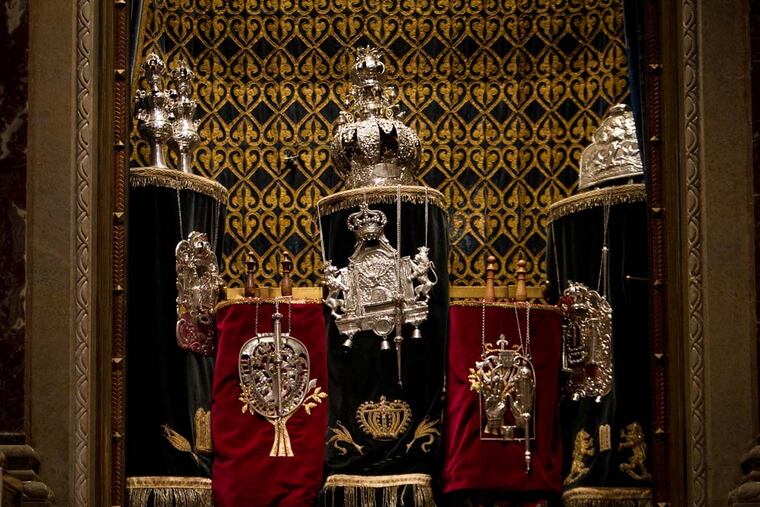Where we worship
Congregation Rodeph Shalom works to improve the world while welcoming all.

AMONG THE central tenets of Judaism is Tikkun Olam, a Hebrew phrase that means "repairing the world."
For the folks at Congregation Rodeph Shalom in Spring Garden, it is a driving force.
A food desert in North Philly? They opened a weekly farmers' market to assure that residents can get fresh produce.
Racial unrest sweeping the nation? They are hosting a "Race in America" community conversation.
Bigots citing religion to discriminate against gays? They revel in diversity and woo worshippers of all sexual orientations - and all faiths and races - to their services.
Who we are: Founded in 1795, Congregation Rodeph Shalom settled into its current home at Broad and Mount Vernon streets in North Philadelphia in 1869. Rabbi William I. Kuhn, a Nashville native and Wharton graduate who has worked there since 1994, became senior rabbi in 1998.
Other clergy: Rabbis Jill Maderer and Eli Freedman and Cantor Erin Frankel. The congregation boasts 1,110 families, and 350 children in its religious school.
Where we worship: A grand 1928 historic-landmark building in the Byzantine-Moorish style. The architecture was inspired by the Great Synagogue of Florence, Italy. Abundant stained glass, hand-stenciled walls and a starburst dome light bedazzle first-time visitors. Ark doors made of Italian bronze hold six Torah scrolls, including one rescued during the Holocaust from Brno in the Czech Republic.
What we believe: Rabbi Freedman cites the congregation's vision statement: "Our vision is to awaken our human spirit to the possibilities within and between us. We create a Jewish community of profound connections through transformative study, prayer and urban engagement. Standing on the shoulders of our historic congregation's founders, we dedicate ourselves to ensuring the future of the Jewish people."
When we worship: Shabbat services are at 6 p.m. Fridays and at 10:45 a.m. Saturdays. An interpreter for deaf and hard-of-hearing congregants visits several times a year for special services including Hanukkah (Dec. 19) and Martin Luther King Jr. Day (Jan. 16).
What we're known for: "We're particularly proud that we're inclusive to interfaith and LGBT people," said Carol Perloff, a congregant. "We're a Reform congregation, . . . welcoming and inclusive to interfaith, interracial and intersexual families. Everybody has a home here and can be comfortable." The congregation has hosted several gay weddings.
Something that might surprise people: "We are welcoming of everyone! Regardless of religion, race, gender, sexual orientation, socioeconomic status, you name it - they are welcome here at Rodeph Shalom," Freedman said.
Good works: Rodeph Shalom last spring established a weekly farmers market, which runs from May through November, to counter North Broad's food desert, a dearth of fresh, affordable produce. Rabbis and congregants alike also have gotten involved in social action. For example, three Rodeph Shalom rabbis participated in a recent die-in outside the Linc protesting police brutality and racism. The congregation also delivers food, or Mitzvah Meals, to troubled congregants.
Big moral issue we're grappling with: "Most recently, the issue of race in America has weighed heavily on many of us in this community," Freedman said. The congregation will host a Race in America conversation at 7 p.m. Tuesday and a Shabbat service at 6 p.m. Jan. 16 (a joint service with Mother Bethel AME Church) to honor the life of the Rev. Dr. Martin Luther King Jr.
If pennies rained from heaven into our facilities budget: A "Legacy Campaign" is under way, with a fundraising goal of $18 million, to improve handicapped accessibility, fire protection, security, sound systems and stormwater management; create a new community room and enclosed exterior courtyard; and greenscaping along Broad Street. The project is expected to be done by April.
God is . . . "One," Freedman replied. "These are the words of Sh'ma (Deuteronomy 6:4), the central affirmation of Jewish theology. At the same time, God is a unique experience for each member of our community. As Martin Buber once wrote, 'God is the most burdened of all words.'"
God moment: For Freedman, it's the birth of his daughter, now 5 months old. "Every time I look at her, it is a God moment," Freedman said.
Words of hope: "Traditionally in Judaism, we believe in the coming of a messiah - a person that will bring about a world of peace. In Reform Judaism, we focus on the idea of a messianic age, a similar time of peace across the world but brought about by all of us together," Freedman said. "By partnering with God in the work of Tikkun Olam, repair of the world, we all have the ability to make the world a better place. It is these small, collective acts that will unite us and inspire us to become, in the words of the prophet Isaiah, 'the repairer of the breach, the restorer of the streets.' "